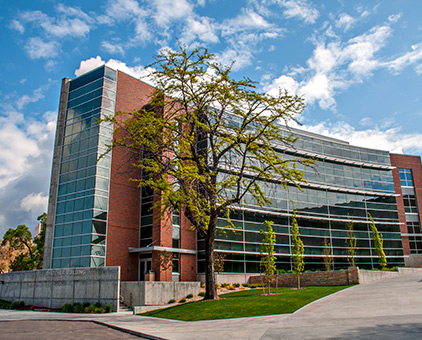Data Science
Bennion
Center
Capstones
Program
Learning Abroad
Office of
Undergraduate Research
Courses
Getting Started
Making Progress
Meet with your advisor often to:
- Discuss your progress
- Learn about course options for DS electives
- Create a path to graduation that works best for you
Keep track of degree requirements:
Finishing Up
- Enroll in senior capstone courses (project or thesis)
- Finish remaining GEs & degree requirements
- Check your degree audit & meet with your advisor to confirm graduation
Community
Getting Started
- Attend Weeks of Welcome events
- Attend the Get Involved Fair & Engineering Club Rush to explore student clubs/organizations
- Meet students & professors in the Data Science Club
Making Progress
- Get connected to the Utah Center for Data Science and the Utah Center for Broadening Participation in Computing (UCBPC)
- Attend research symposiums like the Data Science Seminar
- Form study groups with classmates
- Use your Arts Pass to access events
- Find a job on campus
- Consider getting involved in ASUU
- Become a UCIC Student Ambassador
Finishing Up
- Network with your fellow classmates & professors
- Take on a leadership role in a student-led club or organization
- Get involved with the Alumni Association and Forever Utah
Knowledge & Skills
Getting Started
- Utilize tutoring resources in the Kahlert School of Computing, Math Center, & Learning Center
- Research careers that interest you to get an understanding of skills they require
Making Progress
- Attend a STEM or Computing Job Fair to find internships
- Join a research team & connect with professors whose research interests you
- Learn about research opportunities through OUR including programs like UROP & SPUR
- Enroll in CS 4011: Professional Development to learn about different careers & prepare for entering the job market
Finishing Up
- Take electives that pique your interest & prepare you for your desired career path
- Collaborate with your team to complete your senior capstone
- Present at the Undergraduate Research Symposium
Transformation
Getting Started
- Find a mentor by connecting with faculty & student leaders
- Request a learning consultation through the Learning Center
- Attend a workshop with the Center for Student Wellness
Making Progress
- Check out resources & services available to you at the University Counseling Center
- Go on a learning abroad trip
- Reach out to professors to engage in research experience
- Analyze your study skills - talk to a Student Success Coach about ways to improve
- Complete an internship that allows you to utilize your knowledge & skills
- Consider taking a community-engaged learning course
Finishing Up
- Showcase your skills acquired in the DS program through your capstone project
- Reflect on what you've learned in the program & extracurricular experiences
- Participate in graduation events
Impact
Getting Started
- Attend a Learning Abroad 101 info session
- Engage in service opportunities with the Bennion Center
- Meet with a Student Success Coach
Making Progress
- Apply to work as a TA, tutor, or UCIC Student Ambassador
- Participate in an event through the Utah Center for Data Science
- Go on an Alternative Break through the Bennion Center
- Explore for-credit internships with the Hinckley Institute
- Check out flexible & intensive course options through FLEXU
- Contribute to a project in the Sorenson Impact Center
Finishing Up
- Present research at a local, national, or global conference
- Prepare to develop your capstone project into a business venture or research project
Careers
Getting Started
- Meet with a career coach and explores resources & workshops offered at the Career & Professional Development Center
- Develop a resume & sample cover letter
- Attend Career Fest
Making Progress
- Update your resume and cover letter regularly to reflect your skills and experience
- Seek out an internship and/or undergraduate research opportunity
- Check out internships & jobs posted to COE's Jobs Board
- Attend Pathways or the STEM Career Fair in the fall
- Job shadow or conduct informational interviews with alumni & professionals in your field of interest
Finishing Up
- Meet with a career coach to create a job search plan, do a mock interview, & polish your resume
- Participate in career fairs & expos
- Apply for jobs or graduate programs
Start Your Career Journey
Find support at the Career and Professional Development Center (CPDC)
About the Major
Learning Outcomes
- Demonstrate a knowledge of general computing principles and the ability to develop and work with abstractions.
- Demonstrate a knowledge of classical algorithms and data structures, analyze the efficiency of algorithms, and implement efficient algorithms to solve computational problems.
- Show proficiency in data management and analysis including the ability to gather, clean, and evaluate the worth of data from disparate sources, as well as manage data in a database or data structure so it can be efficiently retrieved for analysis.
- Demonstrate an ability to reshape and assess the significance and robustness of data using statistical and visualization techniques, and use stores of data to model and predict future data from a similar source.
- Understand how the data science pipeline affects facets of science, engineering, and technology, and be able to assess the ethical implications.
- Apply data science techniques to solve challenges while working with a domain expert or in team settings, and demonstrate clear technical communication skills.
Plan & Prepare
At the U, we plan for our students to have an exceptional Educational Experience identified by four broad categories we call the Learning Framework: Community, Knowledge & Skills, Transformation, and Impact. This major map will help you envision, explore, design, and plan your personalized Exceptional Education Experience with the Learning Framework at the core. In addition to assisting you in planning your coursework and navigating the requirements of your major, this map will help you incorporate other kinds of experiences to expand your knowledge, support your development, and prepare you for the future you want.


